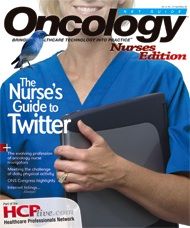Publication
Article
ONCNG Oncology Nursing
The Evolving Profession of Oncology Nurse Navigators
Author(s):
Some of the best news that a patient can receive after being informed that they have cancer is that they have been assigned to an oncology nurse navigator (ONN).
Some of the best news that a patient can receive after being informed that they have cancer is that they have been assigned to an oncology nurse navigator (ONN). The guidance and compassionate care that an ONN provides can make a patient’s journey through treatment much more tolerable. In fact, patients who have had access to an ONN often indicate that they don’t know what they would have done without their nurse navigator; thus, ONNs truly have the ability to change the face of cancer care. Fortunately, ONN positions are being created in hospitals, clinics, and cancer centers across the United States, giving more patients with cancer access to this invaluable resource.
Currently, ONNs most often work with patients who have breast cancer, as this is the population that many institutions target first; however, providers are increasingly recognizing the value of ONNs and their favorable impact on patient outcomes. When a woman is guided by a healthcare professional through the myriad of issues surrounding access to healthcare after a breast cancer diagnosis, the cancer will more likely be treated at an earlier stage, increasing the chance for cure. Based on such findings in the breast cancer community, ONN positions are starting to be created for patients with other tumor types, including lung, colorectal, prostate, and gynecologic lesions. While this is tremendous progress, even patients with rare cancers should have access to an ONN.
As the benefi t of having ONNs is becoming more apparent, many institutions are creating these positions; thus, many ONNs find that there is no real structure or framework around their role. When questioned about their jobs, many ONNs will say that they were hired without a relevant job description, that they have no budget, and that no clear administrative support is available to them. This makes their jobs even more challenging as they must often “create” their job while actually “performing” it, which unlike many other jobs, is one that directly affects the lives of numerous individuals.
In response to this issue, the National Coalition of Oncology Nurse Navigators (NCONN) was formed in January 2008. NCONN is focused on empowering ONNs to create a new paradigm in oncology patient care. Th rough the organization’s membership and dialogue with nurses, hospitals, and cancer centers across the country, NCONN will work to create a framework around this new specialty in oncology nursing. Harold P. Freeman, MD, founder of the Patient Navigation Institute and medical director of the Ralph Lauren Center for Cancer Care in New York, acknowledges the critical importance of the “nurse oncologist” as the nurse navigator to address clinical education and support patient needs while serving as the leader of a system that will ideally also use lay navigators (eg, community outreach workers,
financial navigators, or resource managers) to help patients overcome barriers to care and social work navigators to address psychosocial needs.
A multidisciplinary team approach in which lay navigators, ONNs, and social work navigators work in conjunction with surgeons, pathologists, radiologists, and medical and radiation oncologists is crucial for all patients with cancer, because this disease impacts family dynamics and mental, emotional, and spiritual wellbeing, regardless of an individual’s socioeconomic status. In fact, in many cases, underserved or uninsured populations often require greater support and assistance, because these populations will often neglect caring for themselves for economic or other reasons. Outreach navigators can guide such patients through the process of obtaining gynecologic, prostate, colon, lung, and any other relevant cancer screenings, helping to ensure these individuals actually show up for their appointments and follow-up on any pertinent findings and recommended treatments.
The future of ONNs as leaders in patient care is bright and wide open for growth. Although there are many different titles for this position, nurses will recognize themselves as ONNs if they are interacting with patients following the diagnosis and helping to navigate them through their treatment and follow-up. ONNs can have an active voice in the future of this specialty by coming together and working with NCONN to define and refine their work, as well as sharing helpful patient resources and educational information with one another. ONNs in conjunction with NCONN can play an instrumental role in shaping this profession and how cancer patients receive care. Once the important groundwork is done—such as developing ONN job descriptions, standards of practice, core competencies, orientations, and certifications—the role will be more readily acknowledged and respected for the value it brings to the oncology community.
Tina Beerman, RN, BS, is president and co-founder of the National
Coalition of Oncology Nurse Navigators.
2 Commerce Drive
Cranbury, NJ 08512
All rights reserved.
